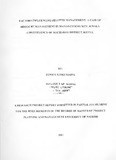| dc.description.abstract | This study seeks to investigate the factors that influence drought management in Mango Community in Mwala District which is found in Eastern province. This area falls under Arid and Semi Arid Lands CASAL) in Kenya. Kenya is a drought prone country mainly attributed to the climate changes, especially due to limited to lack of rainfall that largely affects pastoralists, agro pastoralists and farmers. Drought affects not only the country's economic performance but also its attempts to achieve the millennium development goals. Droughts directly impact on the household food security of over 10 million people living in drought-prone areas.
This study sought to achieve three key objectives: to assess the influence of gender in drought management, to establish the influence of education level in drought management and last but not least to assess the effect of Early Warning Systems in drought management among the people of Mango Community. A section has been committed to the review of related literature. The literature reviewed was done under three subtitles: the influence of gender in drought management, influence of education level on drought management and influence of Early Warning Systems in drought management. This literature gave a review of empirical and theoretical literature related to the three areas of study.
The study used a descriptive survey to investigate these factors. Data was collected through a questionnaire which was piloted before the actual. study for validity and reliability. 99 respondents were targeted as the sample size in this study. From the 120 questionnaires distributed, 104 were collected back and were suitable for analysis. The data collected was analyzed using descriptive statistics to reveal patterns and inferential statistics to draw conclusions and make predictions. This data was analysed and summarized based on the influence of gender, education level and early warning systems in the management of drought. This was presented in the form of frequency tables', cross tabulation and correlation analysis. The study found and concluded that the education levels contribute positively to drought management. It also revealed that although women and men are both affected by drought, women are more affected by drought than their male counterparts.
Early warning systems also playa direct role in management of drought. The study revealed that there is a need- to promote literacy and education that has been seen to be crucial to managing drought. Reducing risks and enhancing people's resilient capacities to deal with disasters requires them to understand how they could best protect themselves. There is need for the government to continue increasing the capacity of farmers and pastoralists in the arid and semi arid lands to manage drought better through both formal and informal education. There is also need to empower communities with resources to be able to respond as most of the people in the area of study did not have adequate resources to respond to drought. | en_US |

